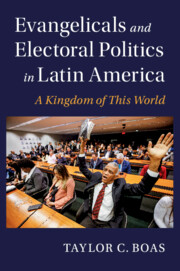Crossref Citations
This Book has been
cited by the following publications. This list is generated based on data provided by Crossref.
Perez-Vela, Rolando
2023.
The Mediatization of Religious Practices in Urban Daily Life: The Peruvian Case.
Religions,
Vol. 14,
Issue. 5,
p.
649.
Samuels, David J.
Mello, Fernando
and
Zucco, Cesar
2024.
Polarization and Perceptions of Status Gain and Loss: The Case of Brazil.
SSRN Electronic Journal,
Fediakova, Evguenia
and
Kahn, Luis Aránguiz
2024.
The Emergence of Post-material Religious Politics: The Case of the Affinity Between Evangelicals and the Right-Wing in Democratic Chile (1995–2021).
International Journal of Latin American Religions,
Vol. 8,
Issue. 2,
p.
632.
Florez, Joseph
2024.
Pentecostal Eschatology, Public Discourse and Political Engagement in Chile.
Studies in World Christianity,
Vol. 30,
Issue. 3,
p.
306.
Ravanilla, Nico
2024.
The Extraordinary Effect of Religious Sect Endorsements on Vote Choice: Evidence From Iglesia ni Cristo’s “Vote as One” Teaching.
Comparative Political Studies,
Anjos, Brandon Lopes dos
Mezzomo, Frank Antonio
and
Fier, Caio Rodrigo
2024.
"É na unção que se encontra poder".
Ciencias Sociales y Religión,
Vol. 26,
Issue. ,
p.
e024010.
Borba, Julian
Silva, Gregorio
and
Amorim, Lucas
2024.
Political cleavages in Brazil: a longitudinal dimension.
Revista Latinoamericana de Opinión Pública,
Vol. 13,
Issue. ,
p.
e31370.
Vilaça, Luiz
and
Turner, Jacob R.
2024.
The new corruption crusaders: Security sector ties as an anti-corruption voting heuristic.
Latin American Politics and Society,
Vol. 66,
Issue. 4,
p.
1.
Smith, Amy Erica
and
Boas, Taylor C.
2024.
Religion, Sexuality Politics, and the Transformation of Latin American Electorates.
British Journal of Political Science,
Vol. 54,
Issue. 3,
p.
816.
ORTEGA, Bibiana
2024.
Conditions for the viability of new evangelical parties: The Colombian Case, 1990–2018.
Social Compass,
Vol. 71,
Issue. 4,
p.
658.
Cáceres Draper, Ignacio
and
González, Andrés
2024.
Progressivism and Religious Disaffiliation in Chile: Responses to Social Movements.
International Journal of Latin American Religions,
Vol. 8,
Issue. 2,
p.
609.
Perelló, Lucas
and
Navia, Patricio
2024.
Partisanship with Rightist and Leftist Parties in Central America: A Test of Four Hypotheses.
International Journal of Public Opinion Research,
Vol. 36,
Issue. 2,
Castillo, Isabel
and
Medel, Rodrigo M.
2024.
Evangelicals and Support for the (Far)Right in Chile’s Rural South.
International Journal of Latin American Religions,
Lecaros, Veronique
and
Romero Mazzini, David
2024.
iglesias y el estallido social peruano (2022-2023).
Cultura y Religión,
Vol. 18,
Issue. ,
p.
1.
Mezzanotti, Gabriela
and
Løland, Ole Jakob
2024.
From Religious Populism to Civil Religion: a Discourse Analysis of Bolsonaro’s and Lula’s Inaugural and Victory Speeches.
International Journal of Latin American Religions,
Vol. 8,
Issue. 1,
p.
279.
Boas, Taylor C.
2025.
Who leads the flock? Religion and the radical right among Brazilian migrants.
Politics and Religion,
p.
1.



